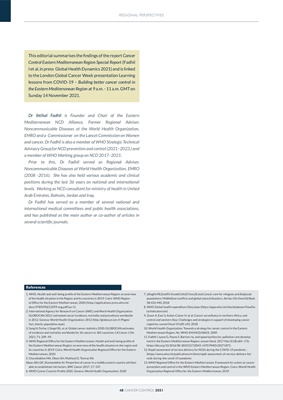
REGIONAL PERSPECTIVES
48 CANCER CONTROL 2021
This editorial summarises the findings of the report Cancer
Control Eastern Mediterranean Region Special Report (Fadhil
I et al, in press Global Health Dynamics 2021) and is linked
to the London Global Cancer Week presentation Learning
lessons from COVID-19 - Building better cancer control in
the Eastern Mediterranean Region at 9 a.m. - 11 a.m. GMT on
Sunday 14 November 2021.
Dr Ibtihal Fadhil is Founder and Chair of the Eastern
Mediterranean NCD Alliance, Former Regional Adviser,
Noncommunicable Diseases at the World Health Organization,
EMRO and a Commissioner on the Lancet Commission on Women
and cancer. Dr Fadhil is also a member of WHO Strategic Technical
Advisory Group for NCD prevention and control (2021-2023.) and
a member of WHO Working group on NCD 2017-2021.
Prior to this, Dr Fadhil served as Regional Adviser,
Noncommunicable Diseases at World Health Organization, EMRO
(2008 -2016). She has also held various academic and clinical
positions during the last 36 years on national and international
levels. Working as NCD consultant for ministry of health in United
Arab Emirates, Bahrain, Jordan and Iraq.
Dr Fadhil has served as a member of several national and
international medical committees and public health associations,
and has published as the main author or co-author of articles in
several scientific journals.
1. WHO. Health and well-being profile of the Eastern Mediterranean Region: an overview
of the health situation in the Region and its countries in 2019. Cairo: WHO Regional Office for the Eastern Mediterranean;
2020 (https://applications.emro.who.int/
docs/9789290223399-eng.pdf?ua=1).
2. International Agency for Research on Cancer (IARC) and Word Health Organization.
GLOBOCAN 2012: estimated cancer incidence, mortality and prevalence worldwide
in 2012. Geneva: World Health Organization; 2012 (http://globocan.iarc.fr/Pages/
fact_sheets_population.aspx).
3. Sung H, Ferlay J, Siegel RL, et al. Global cancer statistics 2020: GLOBOCAN estimates
of incidence and mortality worldwide for 36 cancers in 185 countries. CA Cancer J Clin
2021; 71: 209-49.
4. WHO Regional Office for the Eastern Mediterranean. Health and well-being profile of
the Eastern Mediterranean Region: an overview of the health situation in the region and
its countries in 2019. Cairo: World Health Organization Regional Office for the Eastern
Mediterranean, 2020.
5. Charafeddine MA, Olson SH, Mukherji D, Temraz SN,
Abou-Alfa GK, Shamseddine AI. Proportion of cancer in a middle eastern country attributable to established risk factors. BMC
Cancer 2017; 17: 337.
6. WHO Cancer Country Profile 2020. Geneva: World Health Organization, 2020
7. alSaghirNS,SotoPe -rezdeCelisE,FaresJE,etal:Cancer care for refugees and displaced
populations: MiddleEast conflicts and global natural disasters. Am Soc Clin Oncol Ed Book
38:433-440, 2018
8. WHO Global health expenditure Data base (https://apps.who.int/nha/database/ViewData/Indicators/en)
9. Znaor A, Eser S, Anton-Culver H, et al: Cancer surveillance in northern Africa, and
central and western Asia: Challenges and strategies in support of developing cancer
registries. Lancet Oncol 19:e85-e92, 2018
10. World Health Organization. Towards a strategy for cancer control in the Eastern
Mediterranean Region. No. WHO-EM/NCD/060/E. 2009
11. Fadhil I, Lyons G, Payne S. Barriers to, and opportunities for, palliative care development in the Eastern Mediterranean
Region. Lancet Oncol. 2017 Mar;3)18):e84-176.
https://doi.org/10.1016/S8-30101(17)2045-1470 PMID:28271872 .
12. Rapid assessment of service delivery for NCDs during the COVID-19 pandemic :
(https://www.who.int/publications/m/item/rapid-assessment-of-service-delivery-forncds-during-the-covid-19-pandemic
13. WHO Regional Office for the Eastern Mediterranean. Framework for action on cancer
prevention and control in the WHO Eastern Mediterranean Region. Cairo: World Health
Organization Regional Office for the Eastern Mediterranean, 2019.
References